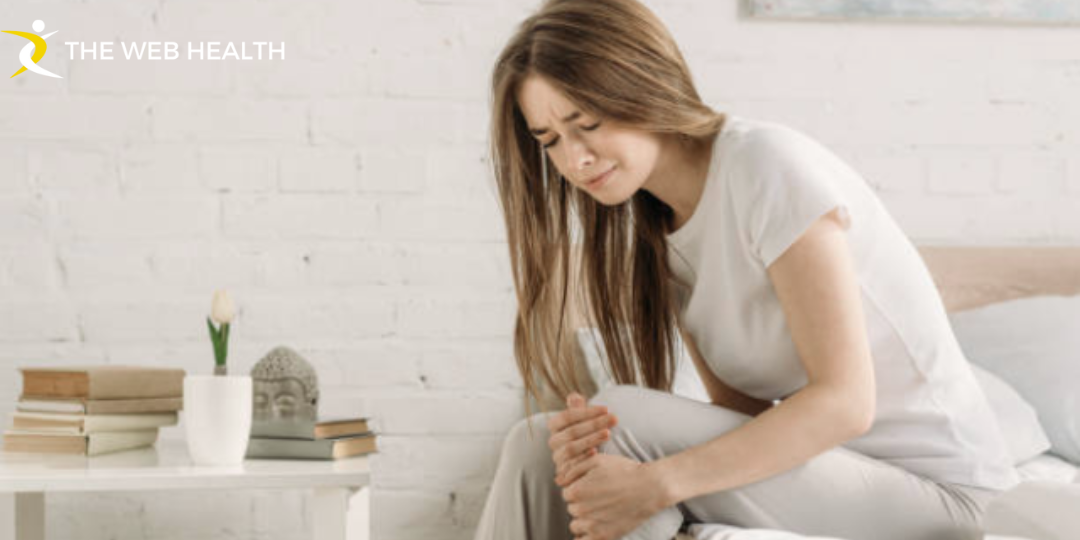Many women suffer from leg pain during their menstrual cycle. According to a study published in the Journal of Coastal Life Medicine, during menstruation, almost 33.3% of teenage girls reported hip and thigh pain.
If you’re asking, “Why do my legs hurt on my period?”—you’re not alone. Affecting daily activities and general well-being, this discomfort can range from a dull ache to sharp pains.
The common causes of leg pain during menstruation will be discussed in this article, together with practical remedies and when to see a doctor.
Is It Common for Legs to Hurt During Your Period?
Yes, leg pain during your period is fairly common and typically not a sign of something serious. Starting as a dull ache, it may become more noticeable as your period progresses. Your thighs, calves, or even knees could all be affected by the discomfort.
This results from the way the uterus functions during menstruation. Nearby nerves and blood vessels can get compressed as it contracts to shed its lining. Sometimes, this compression sends pain signals to the legs—especially the lower back and upper thighs. So, the reason behind your wondering, “Why do my legs hurt on my period?” is how your muscles and nerves respond to your cycle.
Hormones also play a major role. Your body produces prostaglandins—chemicals that cause muscle contraction—during your period. High levels of prostaglandins can lead to stronger cramps and possibly pain that spreads beyond the uterus.
This kind of pain is usually temporary and can be managed with rest, heat, or light exercise. However, if the pain is severe or lasts longer than your period, it may indicate a more serious issue such as fibroids or endometriosis. In such cases, it is advisable to consult a medical professional.
Why Do My Legs Hurt on My Period? Top Reasons
Your period may bring a range of discomforts, including leg pain. Although this seems odd, there are several reasons your legs might hurt during this time of the month. The most common reasons are listed below:
1. Prostaglandins: Hormonal Fluctuations
Hormonal changes are one of the main causes of leg discomfort during your period. Prostaglandins, chemicals that help your uterus contract to shed its lining, also cause inflammation. This inflammation can affect nearby muscles, leading to pain that radiates down to your legs. These hormones can also affect the large intestine, causing cramps that extend to the thighs or calves.
Interestingly, some promise in relieving period-related pain has been shown by reducing inflammation with supplements such as omega-3 fatty acids and vitamin D.
2. Nutritional Deficiencies and Dehydration
Your body loses more fluids during your period, which can cause dehydration. This lack of hydration can make your muscles more prone to cramping. Low levels of key minerals like magnesium can also cause muscle tightness and leg cramps. Staying hydrated and restoring magnesium levels can help prevent and ease muscle pain.
3. Pelvic Congestion Syndrome
Pelvic congestion syndrome occurs when blood vessels around the pelvic region swell and enlarge. This can cause heaviness and discomfort that may radiate down the legs. Menstruation can make this condition more noticeable because of increased blood flow to the pelvic area.
Why Do My Calves or Thighs Hurt During My Period?
During your period, your thighs or calves may feel more sensitive. Usually, there are a few particular reasons behind this discomfort:
1. Hormonal Reactions in Veins
As the hormone progesterone rises in your menstrual cycle, blood vessel function changes. This hormone allows veins to relax so blood may gather in your legs. That can cause the heaviness and pain your thighs or calves experience. Keeping your legs raised or engaging in light exercise can help increase circulation and reduce pain.
2. Endometriosis: Network Involvement
Conditions like endometriosis, where uterine lining tissue grows outside the uterus, can also lead to leg pain. Other areas of endometrial tissue can irritate pelvic nerves, causing pain that radiates to the thighs or even the calves.
If you have persistent or severe pain, you should see a doctor for further evaluation. You might also benefit from pelvic floor therapy, especially if the pain is linked to chronic tension or pelvic dysfunction.

Other Symptoms That May Be Related to Leg Pain
Your period can cause other symptoms besides leg pain. Many more factors may bring discomfort during this time:
- Lower back pain, usually connected with menstrual cramps
- Hormonal changes causing water retention, leading to bloating
- Tiredness due to blood loss and hormonal changes
- Variations in appetite or bowel movements
If you’re feeling emotionally off too, it might be due to hormone shifts. Small actions to relieve stress, such as meditation, yoga, or journaling, can make a noticeable difference in how your body responds to period pain.
Relieving Leg Pain During Your Period
If your period causes leg pain, you are not by yourself. Though it’s a typical problem, there are several ways to lessen the discomfort. This is how one finds relief:
1. Use Heat Therapy
Heat is among the best ways to reduce leg discomfort. A heating pad or hot water bottle releases tension, improves blood flow, and helps muscles to relax. Try heating for 15 to 20 minutes at a time to help with the most severe pain.
2. Stay Active with Light Exercise
Though it would seem contradictory, light movement can reduce leg pain. Walking or stretching helps muscles to relax and increases circulation. Just keep it light; strong workouts could aggravate the pain.
3. Stay Hydrated
Leg cramps can aggravate dehydration. Drinking lots of water throughout your period helps your muscles stay moist and might help with cramps. It can also ease general discomfort and help to lower bloating. If you’re looking for more comfort options, you can take a bath on your period to help your muscles relax and reduce tension in your legs.
4. Massage and Stretch Your Legs
Massages of the legs gently can do miracles. Massaging your thighs or calves will increase blood flow and help to release muscular tension. Use your hands or a foam roller; a soothing lotion or oil will help to improve the effect.
5. Try Magnesium-Rich Foods or Supplements
Muscle function depends on magnesium; a lack can cause cramps. Magnesium is abundant in foods including almonds, spinach, and bananas. To help with leg discomfort, you might also think about a magnesium supplement.
6. Eat Anti-Inflammatory Foods
Certain foods naturally have anti-inflammatory effects that might ease menstrual discomfort, including leg cramps. Good specimens are ginger, turmeric, and fish high in omega-3s. Including these in your diet throughout your period might help.
7. Consider Over-the-Counter Pain Relievers
If leg pain is severe, over-the-counter medications like ibuprofen or acetaminophen can help. Be sure to follow dosage guidelines and consult a doctor if you have any underlying health conditions.
When Should You See a Doctor?
While leg pain during your period is usually manageable at home, there are times when it’s best to consult a doctor. See a healthcare provider if you notice any of the following:
1. Severe or Persistent Pain
If leg pain interferes with daily activities or lasts several days, it’s time to see a doctor. Long-lasting or intense pain may indicate an underlying issue that needs treatment.
2. Warmth, Redness, or Swelling
If your legs are unusually warm, red, or swollen, it could be a sign of an infection or deep vein thrombosis (DVT), a condition where blood clots form in the veins. Seek immediate medical attention.
3. Pain That Spreads Beyond the Legs
If your leg pain spreads to the abdomen or lower back, it could indicate a more serious condition like endometriosis. This disorder causes tissue similar to the uterine lining to grow outside the uterus and can lead to widespread pain.
4. New or Unexplained Symptoms
If other unusual symptoms appear—such as fever, fatigue, or heavy bleeding—there may be an underlying issue. A doctor can help rule out problems like hormonal imbalances, infections, or fibroids.
5. Difficulty Walking or Moving
If leg pain makes it hard to walk or move, seek medical care immediately. This could point to nerve issues or circulation problems that need professional treatment.
Always better to be cautious. If you’re unsure about your symptoms or if home treatments don’t help, speak with a healthcare provider. They can diagnose the problem and suggest the best treatment to help you recover.
What Women Have to Say About Period Leg Pain
Some women describe the pain as a dull ache down their thighs. Others say it feels like a heavy pull in their calves that worsens with standing or walking. It usually comes at the same time each month—before or during their period.
One woman shared that her legs hurt for two to three days each cycle. She said the pain travels down her legs from her lower back. Another mentioned tingling in her thighs that gets worse with strong cramps.
Many link leg pain to the first few days of heavy bleeding. Heat pads and rest help some. Others find relief from walking, stretching, or staying hydrated. Most agree it’s unpleasant but manageable—unless it becomes severe or lasts too long.
These real experiences show how common and real this pain is. For many, it’s a regular part of their cycle, though it’s not often talked about.
FAQs
Are period cramps likely to cause leg pain?
Yes. When your uterus cramps, it can press on nearby nerves. These nerves also run down your legs, so pain may start in the abdomen and move into the thighs or calves.
How long does leg pain last during menstruation?
Usually, it lasts one to three days, often matching the heaviest bleeding days. The pain usually fades once hormone levels stabilize.
Is leg pain during periods a sign of something more serious?
Not always, but it can be. Sharp, one-sided pain or pain that lasts long after your period could signal issues like endometriosis or a pinched nerve.
Last Words
If you’re still wondering, “Why do my legs hurt during my period?” the answer depends on your body. For most women, it’s caused by hormone changes and muscle tension. For others, it may point to a medical issue.
Either way, you don’t have to suffer in silence. Pay attention to your body. Track when the pain starts and how long it lasts. Simple steps like staying active, drinking water, or using heat may help.
If the pain is too much or doesn’t go away, talk to a doctor. Getting answers is the first step to feeling better.


